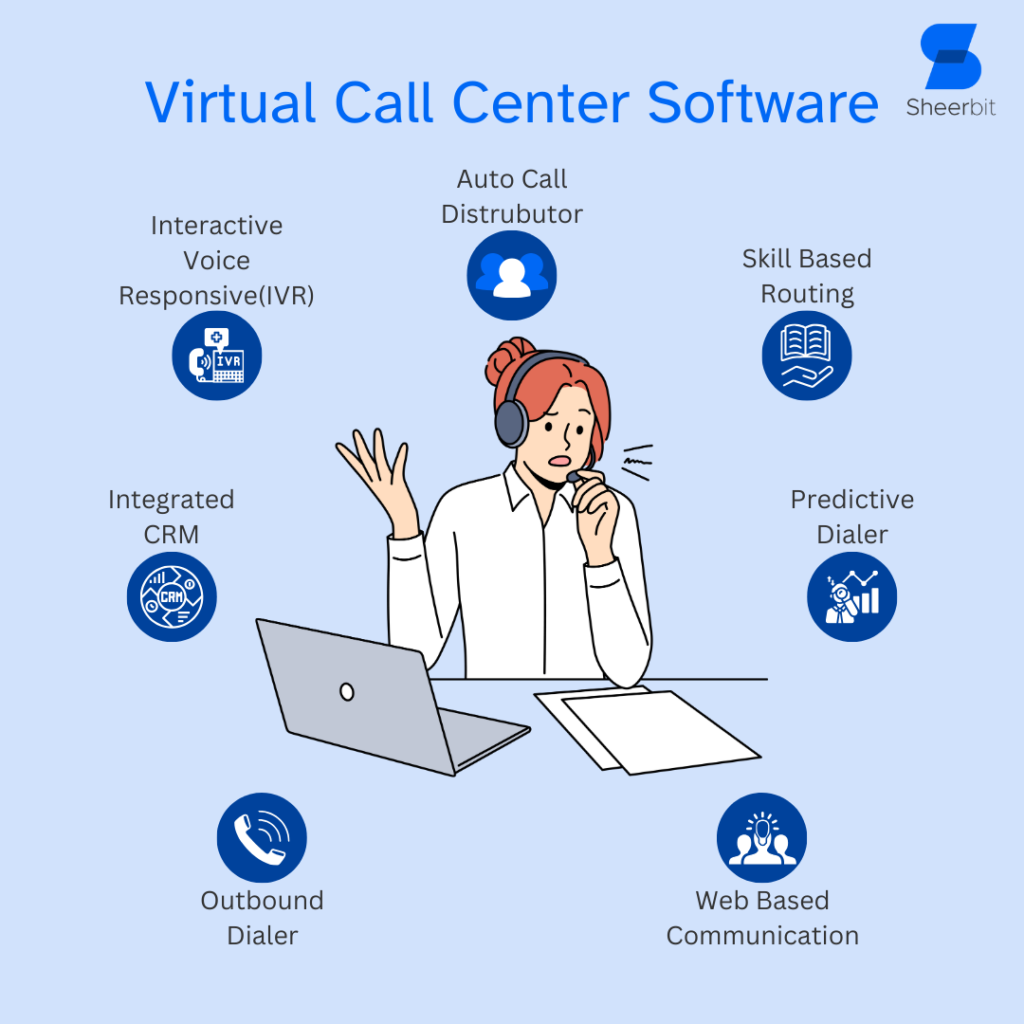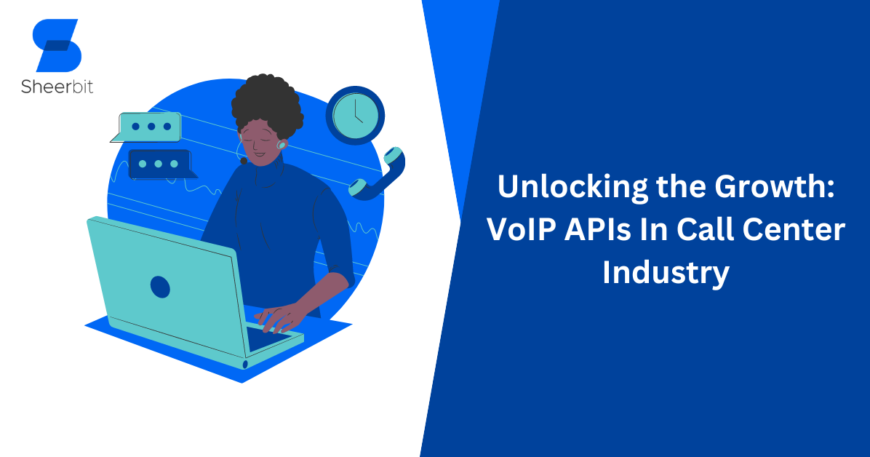Recent decades have seen a considerable transformation of the call center sector due to changes in client needs and technology improvements. VoIP technology is one of the most innovative advancements in this industry. VoIP’s feature-rich and reasonably priced communication alternatives have fundamentally altered how contact centers operate. VoIP APIs, on the other hand, optimize VoIP’s potential in the contact center sector. We’ll examine how VoIP APIs in the Call Center industry change the call center industry and why excellent customer service depends on them.
The Evolution of Call Centers
Before we go into VoIP APIs, let us take a moment to talk about the evolution of call centers. For contact centers, on-site Private Branch Exchange (PBX) systems were standard for voice conversations. These systems could be more flexible and scalable and have substantial maintenance costs. As a result, contact centers faced several challenges, including exorbitant operational expenses, limited alternatives for call routing, and difficulty handling large call volumes.
The introduction of VoIP technology altered the situation. VoIP reduced call costs and required no expensive equipment by enabling contact centers to route calls online and introducing interactive voice response (IVR), call recording, and voicemail-enhanced customer relationships. Still, a significant shift occurred when VoIP APIs were brought to the call center sector.

What Are VoIP APIs?
VoIP APIs are a set of tools and protocols that developers may use to integrate voice and messaging capabilities into their applications and systems. By serving as a conduit between software and telecom networks, they let businesses design customized communication solutions that meet their specific needs.
VoIP APIs provide a wide range of features, such as:
1. Voice Calls: Voice calls may be placed and received online.
2. Messaging: SMS, MMS, and chat messages may be sent and received.
3. Call Routing: Create rules for call routing that are specific to your needs.
4. Call Recording: Calls should be recorded and stored for compliance and quality control.
5. IVR Systems: Create automated customer care solutions with interactive voice response.
6. Conferencing: Easily set up audio and video conferences.
7. Real-time Analytics: For performance tracking, access analytics, and real-time call statistics.
The Benefits of VoIP APIs in the Call Center Industry
1. Enhanced Customer Experience
Experience with customers is crucial in contact centers. Contact centers can deliver a seamless and personalized customer experience thanks to VoIP APIs in the Call Center Industry. With personalized IVR systems, for example, callers may quickly receive the information they want by browsing the available options. Customers may feel appreciated if they receive personalized welcomes and have their calls routed according to previous callers.
2. Scalability and Flexibility
The incapacity of traditional PBX systems to grow was widely acknowledged. Conversely, VoIP APIs in the call center sector offer unmatched scalability. Call centers may scale up or down based on the volume of calls, so they are always prepared to handle peak loads. This flexibility is crucial for businesses that are growing fast or seasonal.
3. Cost Savings
Financial savings via VoIP APIs are significant. Upkeep of traditional phone lines and hardware might be pricey. VoIP APIs leverage internet resources to reduce call costs drastically. It is also a cost-effective alternative for contact centers of all sizes since it eliminates the need for costly infrastructure.
4. Efficient Call Routing
Robust call routing may significantly improve call centers. Call centers may implement advanced routing strategies that consider caller location, language preferences, and agent availability by using VoIP APIs. When the correct person answers calls, there are fewer wait times and higher first-call resolution rates.
5. Integration Capabilities
The integration of VoIP APIs is an essential factor to take into account. With other business tools, such as CRM systems, they may be easily connected. This suggests that agents have access to all the customer data they need throughout talks, resulting in more knowledgeable and productive exchanges.
6. Real-time Analytics
Data is a vital component of every call center. VoIP APIs provide contact centers with immediate access to analytics and reporting tools to track workflow, spot bottlenecks, and make wise decisions to enhance operations. This leads to increased output and improved customer support.
7. Disaster Recovery
Call centers cannot afford to have downtime. VoIP APIs are pre-configured with disaster recovery plans that ensure that, in the event of a network outage or other catastrophe, calls may be routed to backup sites or agents working remotely. This level of redundancy is required to guarantee business continuation.
Real-world Applications of VoIP APIs
To better understand the possibilities of VoIP APIs, let’s examine some real-world applications in the contact center industry:
1. Virtual Call Centers
Agents in virtual contact centers may operate from any place with an internet connection by setting up VoIP APIs. This flexibility offers call centers access to a global worker pool and facilitates balancing agents’ personal and professional lives.
2. Multichannel Customer Support
Consumers expect to interact with companies through various channels, including chat, SMS, and phone calls. VoIP APIs enable call centers to guarantee that customers may select their preferred communication channel by offering multichannel help.
3. Outbound Sales and Marketing
Receiving calls is not the only purpose for VoIP APIs. Campaigns for outbound sales and advertising might also take advantage of them. For example, predictive dialers may increase the efficiency of outbound contact centers by automating the lead-calling process.
4. Integration with CRM Systems
Contact center employees get immediate access to consumer data thanks to the integration of VoIP APIs with CRM systems. Agents are provided with a comprehensive view of the client’s prior interactions and preferences, positively impacting customer interactions.
5. Third-party Application Integration
Schedule software and payment processors are just two examples of the many applications in which VoIP APIs may be utilized. Call centers may now offer additional services to customers due to the streamlining of processes.
Challenges and Considerations
VoIP APIs have a lot of benefits, but there are some drawbacks and things to think about as well:
1. Security and Compliance
Managing sensitive customer data and abiding by regulations such as GDPR and HIPAA are crucial factors to consider. Call centers must follow strict security procedures, and VoIP providers must prioritize privacy and legal compliance.
2. Quality of Service
VoIP call quality is dependent on the stability of the internet connection. Call centers need a stable internet connection with adequate bandwidth to ensure call quality, particularly during peak hours.
3. Training and Adoption
Before deploying VoIP API, call center staff must get training. For agents to be as effective as possible, they must feel comfortable using the new tools and processes.
4. Vendor Selection
Selecting the finest VoIP API service is vital. Crucial aspects are pricing, scalability, dependability, and the range of features and integrations.
Conclusion
VoIP APIs have opened up a whole new world of possibilities for the contact center sector. From being cost centers to vital hubs for consumer relationships, call centers are changing. VoIP APIs are essential for contact centers hoping to maintain competitiveness in today’s fast-paced business world. They provide better client experiences, financial savings, scalability, and various integration options. As technology develops, we see VoIP APIs becoming more critical in shaping contact center operations, offering excellent customer support, and promoting business success. Contact Us to embark on your journey to develop VoIP APIs for your Call Centers.





